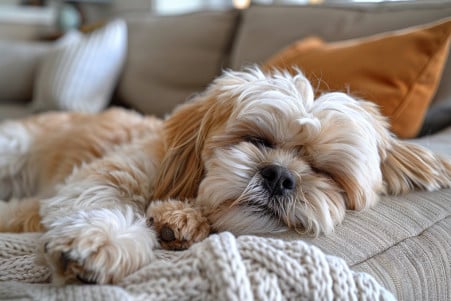Why Do Dogs Bark at Some Animals and Not Others? The Science of Canine Communication
24 January 2024 • Updated 12 February 2024

If you’ve ever wondered why your dog seems to save their barking for certain animals, you’re not alone. There are a number of reasons why dogs bark at some animals and not others, including past experiences, training, scent, and territoriality.
Dogs use their senses, especially their sense of smell and hearing, to determine if an animal is a threat or if they need to communicate with it, and this can determine whether or not they bark.
To better understand this phenomenon, we’ll look at research from animal behaviorists, ethologists, and dog psychologists. We’ll also look at research on scent, experience, socialization, and breed differences to better understand the many factors that go into a dog’s selective barking. By the end of this article, you’ll have a better understanding of the many factors that go into a dog’s barking and how they interact with a dog’s cognitive and environmental factors.
Why do dogs bark at some animals and not others?
Sensory Triggers and How Dogs Perceive the World
Dogs have highly sensitive senses, particularly smell and hearing, that play a large role in how they perceive the world around them.
According to PAWS Chicago, a dog’s sense of smell is thought to be 100,000 times better than a human’s, and they can hear sounds that are four times farther away than humans. This means that dogs can smell and hear animals that we can’t even detect.
A study in ScienceDirect even found that dogs have evolved to differentiate between scents based on their familiarity, with the caudate nucleus in their brain responding more to familiar human scents, which indicates a positive response.
This helps explain why a dog might bark at an unfamiliar animal but not at one it knows. Meanwhile, a study in PMC found that the canine olfactory system can detect both current and historical scents, which could explain why a dog might bark at the scent of an animal that it has encountered in the past.
This sensitivity to scent is an evolutionary adaptation that helps dogs find food, avoid danger, and find mates, and it’s a sign of their evolution as domesticated animals with specialized skills. Knowing this, it’s easy to see how a dog’s sensitivity to certain scents could lead to selective barking. It also sets the stage for future research into how a dog’s past experiences and training may also play a role in this behavior.
Experience: How a Dog’s Past Affects Barking
While a dog’s breed and genetics play a role in barking, so does a dog’s past. A dog’s barking tendencies are not only influenced by genetics but also by past experiences and behavioral conditioning.
A study featured on ResearchGate found that a dog’s history of training and interactions with people had a significant impact on their problem-solving behavior, including how they responded to barking. This means that dogs may be more likely to bark at certain animals based on their past experiences or training that has reinforced certain behaviors.
In addition, Research from ScienceDirect found that people can perceive emotional information from the acoustic parameters of dog barks, and these parameters are influenced by a dog’s past experiences and learning. If dogs have been conditioned to associate certain animals with certain emotions, such as fear or aggression, they may express those emotions through barking.
As we learn more about the impact of training and past interactions with people on a dog’s behavior, we also learn more about the impact of learned behaviors on a dog’s life. These studies show that it’s important to take a dog’s unique past into account when trying to understand their selective barking. With this in mind, we’ll move on to explore how a dog’s early socialization can impact their reactions to other animals.
Socializing With Good Neighbors: How Socialization Affects Canine Barking
The early months of a dog’s life are important for shaping its future behavior, especially in terms of how it interacts with other animals.
Dogs learn to understand their environment, including how to interact with other species, during the critical socialization period, which occurs between 3 and 12 weeks of age.
A paper from PMC by Pauleen C. Bennett explains that dogs who are well-socialized during this time are less likely to have behavioral issues like aggression and fearfulness and are more likely to show positive social behaviors toward humans. This time is a critical period for shaping a dog’s future interactions and barking at other animals.
In addition to socialization, a dog’s breed can also play a role in how much it barks. PetMD explains that humans have bred certain dogs to be more vocal in order to alert them to the presence of other animals, and this has led to an increased likelihood of barking in certain breeds. For example, herding dogs may be more likely to bark at moving animals because of their history as working dogs.
A dog’s socialization with other species during this important period can determine how much it barks at those species later in life. If dogs aren’t properly socialized as adults, they may be more likely to bark at other animals. This is important to know because these early socialization experiences can determine a dog’s behavior for the rest of its life.
Breaking Down the Bark: Evolutionary and Genetic Roots
The bark of a dog is more than just a sound; it’s a behavior that has evolved and been genetically shaped over time. According to research covered by ScienceDaily, domestic dogs have a special propensity to bark that is not found in other animals, and this may be due to their long history of living near human settlements.
This behavior may have evolved from a phenomenon called mobbing, which is an anti-predator response that is the result of an internal conflict between the desire to flee and the desire to fight.
Genetic influences also play a role in a dog’s tendency to bark at certain animals. As reported by BMC Genomics, genetic markers can be used to predict the behavior of dogs, which means that certain breeds may be more likely to engage in certain types of barking. This is supported by research from ScienceDirect, which shows that humans have likely bred dogs to bark for a variety of reasons, including hunting and guarding.
The result of selective breeding during the domestication process is that barking behaviors have been shaped in different ways in different breeds. This knowledge of the genetic and evolutionary roots of barking helps explain why dogs may only bark at certain animals and can help inform the development of effective behavior modification techniques.
Customizing Training: Techniques to Deal With Selective Barking
To deal with selective barking in dogs, it’s important to know why they’re barking. For example, if your dog is barking due to excitement or frustration, as explained by the American Kennel Club, Behavior Adjustment Therapy (BAT) can help. This technique works to desensitize your dog to other dogs and teaches them to control their impulses by rewarding them for not reacting or for reacting politely.
When it comes to changing your dog’s barking behavior, it’s important to be patient and consistent.
As recommended by PetMD, make sure you’re meeting your dog’s needs for exercise, mental stimulation, and social interaction to help reduce barking that’s due to boredom or a need for attention.
If your dog is barking due to anxiety or fear, you can help them overcome their fear by using treats and praise to create a positive association with the thing that scared them.
It’s also important to see a vet if your dog’s behavior changes suddenly, as this could be a sign of an underlying issue, such as pain or cognitive dysfunction. By using these techniques in conjunction with a deep understanding of your dog’s communication signals, you can more effectively train and manage your dog, which will lead to a better relationship for everyone involved.
Breaking Down the Doggie Dialogue: A Summary of Selective Barking
In this deep dive into dog barking, we have covered the many complex reasons why dogs bark at different animals. There are a wide variety of factors that go into this behavior and help determine how and why dogs bark, including a dog’s sensory perceptions, personal experiences, early socialization, and genetic and evolutionary roots.
We have learned that a dog’s keen sense of smell and hearing are important in determining whether a bark is directed at a squirrel in the distance or a cat in the neighborhood. A dog’s past experiences, both good and bad, will determine how they respond to different stimuli, including their barking.
Early socialization is important in shaping a dog’s future behavior, while genetics and breed-specific traits mean that some dogs are more likely to bark than others.
Understanding these factors is important for dog owners who want to use training and behavior modification to control selective barking. In the end, understanding the complexity of dog barking can help people and their pets coexist more successfully and with better accord.


